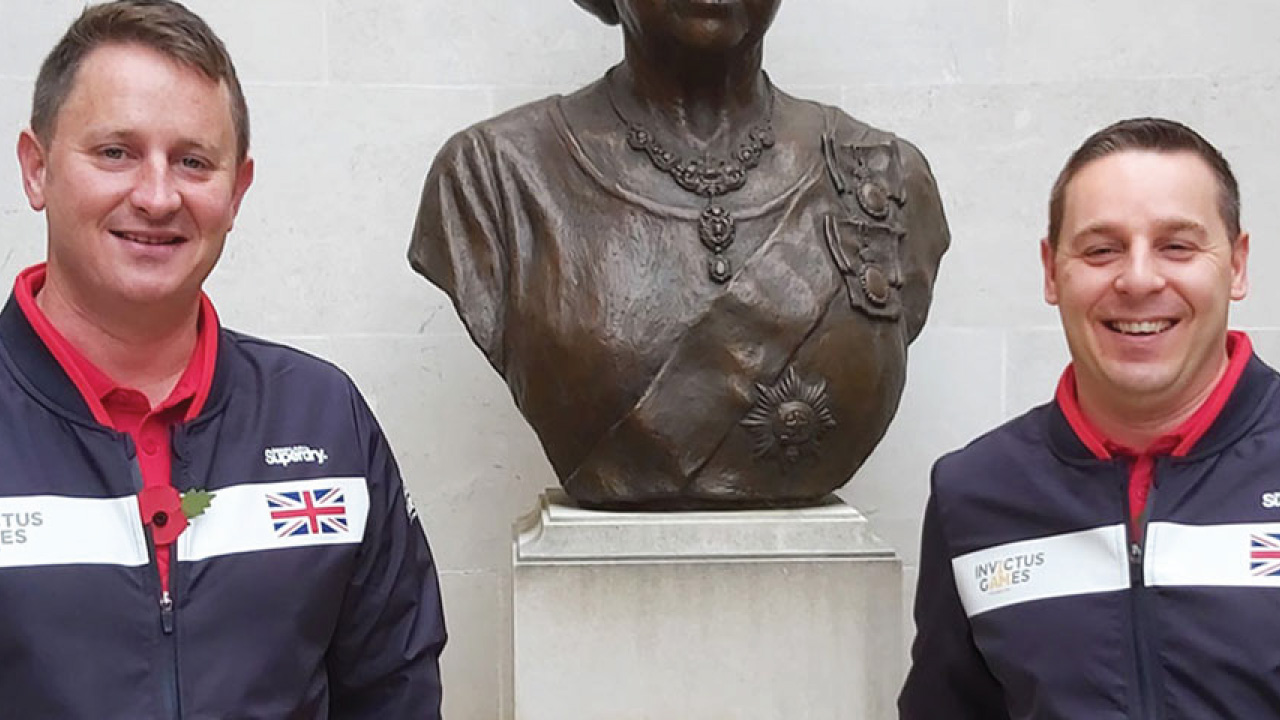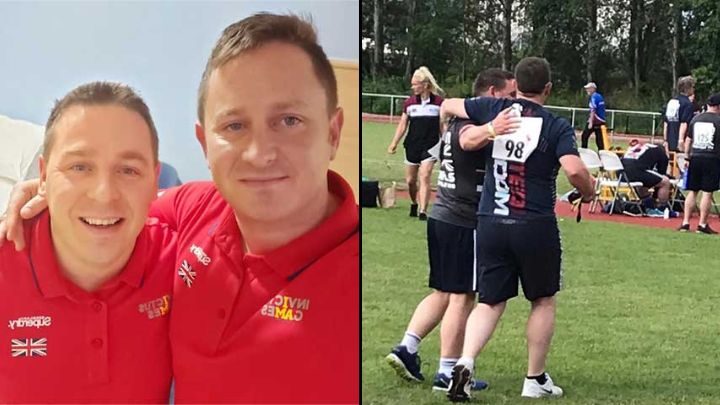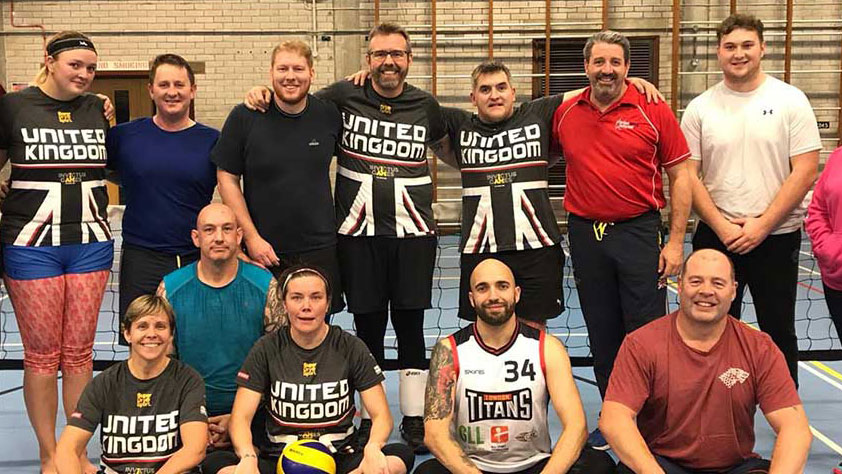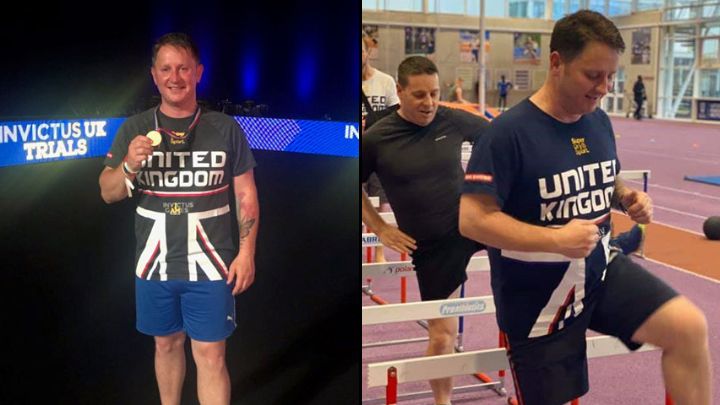
As an official supporter of Invictus UK, Tetra Tech is delighted to follow the recovery journey of some of Team UK competitors.
Taking part in the Invictus Games, of course, isn’t about winning, but using the power of sport, teamwork and competition to support the recovery of brave men and women who have become sick or wounded in service of their country.
But for Team UK competitors Antony and David Morris, a little brotherly competition can’t be dismissed so easily. By Antony’s own admission, “It’s not meant to be competitive. We just can’t help ourselves. When we were trying out for the 100 metres, we were trying to outdo each other by about point three of a second or something.”
“It was ridiculous.”
David is quick to retort, “I’m still in the lead.”
This banter and comradery propelling the brothers forward is a far cry from where they were before the Invictus UK programme gave them a second chance at life.
A Corporal in the Royal Air Force since 2000, David was diagnosed with severe post-traumatic stress disorder following an incident in 2011 and would later represent Team UK at the Invictus Games Sydney 2018. Antony, meanwhile, is a former RAF Squadron Leader, medically discharged from the military and diagnosed with Chronic Fatigued Syndrome.
The mental and physical pains from this have left both the brothers prone to isolation. But through taking part in the Invictus UK programme and the loving support of their families, the two have found a new lease on life, inspired and motivated to become the best versions of themselves despite their ailments.
These brothers espouse many of the values of collaboration, social responsibility, and problem-solving that we share at Tetra Tech. We sat down with the brothers for a chat to discuss how they’ve been progressing at the training camps since the Invictus UK Sheffield Trials, and what they’re looking forward to at the Invictus Games in The Hague this upcoming May.
What motivated you to get involved with Team UK?
David: After going through what I did, I was diagnosed with PTSD. My family helped me out along the way, but it was my brother who encouraged me to go to the Invictus Games Sydney in the first place back in 2018. This time, my goal is to help other new competitors understand what their recovery journey involves.
Antony: I suffer from Chronic Fatigue Syndrome, which really impacts my ability to engage with sport on a regular basis. Invictus has given me a reason to get out of the house and the ability to constantly test my limits in a very supportive and non-judgmental environment.
What was the best thing about participating at the Invictus UK Trials in Sheffield last summer?
Antony: When you find yourself discharged from the military like I was, the longer you’ve been in, the harder it hits you. That environment isn’t just about wearing a uniform, but all the parts that come from being part of a team with a common purpose: the understanding, the banter, humour, common bonds. You lose that, and with that comes mental health issues.
Sheffield was superb for that reason, watching so many people come back into an environment of banter they hadn’t experienced for quite a while – smiles on people’s faces. You can’t put a price on how that made me feel after having been so lonely after discharge.
How has Invictus UK Journey impacted your life so far?
David: We were at a very low point around 2016/2017. Both of us were in our own little world, struggling to re-engage with our own families and those around us. Invictus has given us the ability to be positive again and that rubs off on your family.
Antony: Yes, before the games, we weren’t thinking about anyone else. I used to be a welfare officer, which was my reason for ‘being.’ I loved helping other people, and getting involved in this, you get to do that again.
David: I’ve seen big differences in Antony since the beginning. When he put me forward for Invictus in the first place, I was a person with no confidence at all, struggling with everyday life. But when he saw me progressing after just a few training camps, he noticed an old spark coming back.
This time around, that’s exactly what I’ve noticed with Antony. He was unlucky enough to be discharged and that’s not what he wanted – he lived and breathed his military career – but I can see the Invictus journey making him realise his self-worth all over again, improving his physical and mental capabilities.
How has your family reacted to your progress?
David: Me and my brother are kind of viewed now as heroes in the family, which I don’t really see personally. But it’s nice because they’ve seen some of the problems we’ve had and they’ve wondered how to pull us out of a dark place and Invictus has managed to do that. So they’re seeing the old us, which translates into all areas of life when we’re together as a family.
Antony: I’ll be quite honest: I wasn’t a nice person to be around, but Invictus has changed the dynamic for the better. Both my children crave outdoor time, swimming and cycling – all the stuff I’ve had no capacity for. So I’ll now go out and do some of my training with my children. They’ve absolutely loved the fact that I’m able to do more stuff with them again. My wife’s also observed that I’m able to do more at home as well, so she’s not carrying as much of a burden.
David: It’s the same for me. I’ve got three children as well. They suffered from me not wanting to do that much with them, not through any fault of theirs. It was just down to my confidence and the ripple effect from that extended outwards to my family in huge ways.
Antony: It’s slow and steady, but sport is making a difference. You have to be a bit selfish about your wellbeing to make sure you can then get back to supporting your family and supporting someone else. That’s hard coming to terms with when you’re used to supporting others.
What drew you to your chosen sports?
David: For me, it was the challenge, especially with swimming. The volleyball, I love because it’s a team sport. Because of the things I’ve experienced, I didn’t want to be by myself, and I think sometimes people can find the pool quite a lonely place, especially because you can’t hear anything. But pushing through that challenge has helped massively because I’m able to do stuff without overthinking.
Antony: It was quite tough. I went to the try-outs and tried every sport possible. I really enjoyed swimming and sitting volleyball, but my condition doesn’t allow me to do the amount of training required – my energy drops off too quickly. I narrowed it down to short distance running, powerlifting, and indoor rowing. Most of the training for those can be done in short, sharp power bursts, gives me a balance between achieving something and not making myself worse.
How have the training camps been going?
David: Me and my brother are kind of viewed now as heroes in the family, which I don’t really see personally. But it’s nice because they’ve seen some of the problems we’ve had and they’ve wondered how to pull us out of a dark place and Invictus has managed to do that. So they’re seeing the old us, which translates into all areas of life when we’re together as a family.
Antony: I’ll be quite honest: I wasn’t a nice person to be around, but Invictus has changed the dynamic for the better. Both my children crave outdoor time, swimming and cycling – all the stuff I’ve had no capacity for. So I’ll now go out and do some of my training with my children. They’ve absolutely loved the fact that I’m able to do more stuff with them again. My wife’s also observed that I’m able to do more at home as well, so she’s not carrying as much of a burden.
David: It’s the same for me. I’ve got three children as well. They suffered from me not wanting to do that much with them, not through any fault of theirs. It was just down to my confidence and the ripple effect from that extended outwards to my family in huge ways.
Antony: It’s slow and steady, but sport is making a difference. You have to be a bit selfish about your wellbeing to make sure you can then get back to supporting your family and supporting someone else. That’s hard coming to terms with when you’re used to supporting others.
What’s the next stage after Invictus Games The Hague 2020?
David: Long-term, it’s about setting goals. It doesn’t stop here. It’s essential that people plan now before they come home from the Games to have a goal to concentrate on. It’s such a huge event that for some people, they find if they haven’t set themselves any targets, they come home from the games and it’s a comedown. So I try to talk to them about what they’re going to do after the games, whether that’s a sport or something else to continue recovery.
Antony: I want to keep sport going with my children. I’ve really enjoyed the powerlifting, which has given me something I can do that my condition works with and I’ve enjoyed getting down to the gym and meeting people down there as well. I’ve not had the capacity to be competitive outside of my training for the Invictus games so I was thinking I might get into competitive lifting.
What are the key messages you hope outsiders will take away from that?
David: People shouldn’t have to hide away and keep problems to themselves. With those shared experiences, you find out it’s not such a lonely place because other people are going through the same, if not worse than you. Everybody has different levels of disability or mental health issues but communicating that to other people in a similar situation could be a life saved.
Antony: Mine’s more of a hidden illness. I’m hoping I can get a message out about chronic fatigue and the hidden illnesses I know people don’t see but affect veterans, teaching them that they can be effective at dealing with them, I was terrified about being judged because people don’t know anything about this. I’m trying to raise some awareness by saying you need to overcome that and recognise the benefits sports bring.
We look forward to sharing more insight into Antony and David’s recovery from some of their family members. Watch out for other interviews in the near future.
Connect with us. Reach out to our experts.


